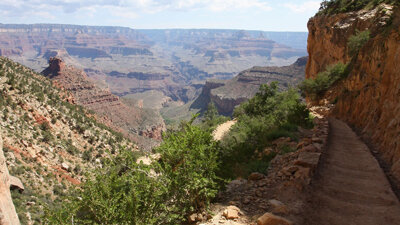
Bright Angel Trail in Grand Canyon National Park.
By Marjorie “Slim” Woodruff | PREVIEW Columnist
The uppermost switchback on the Bright Angel Trail in Grand Canyon National Park is 8 feet wide. Yet the last time I hiked out, I was stymied by a group of young hikers walking down shoulder to shoulder, tapping on their phones.
Even when I said, “Ahem, excuse me,” I was unceremoniously nudged out of the way — not on the cliff side, but still.
It shouldn’t need mentioning, but while walking on a rocky trail where one may fall to one’s death, it is best not to be watching one’s phone. And in case you were wondering, uphill has the right of way.
I am often told that people coming downhill should have the right of way because they might lose control and can’t easily stop. Well, on a shared trail, one should not be losing control, and certainly not on a trail where a fall could lead to dying, as above.
Uphill has the right of way because it is harder to stop and restart while climbing. Yes, some hikers want to stop and rest and that is their prerogative, but if I have my uphill mojo going, I don’t want to stop.
Downhill hikers also have a much wider field of vision. Climbing up, I usually see only my feet, particularly if I’m wearing a sunhat. Since most injuries occur on the way down a trail, it might behoove one to slow down and pay attention in any case.
Nor does this apply only to hikers. On a four-wheel drive road, the driver coming down must pull over for the driver coming up.
In mountain biking, uphill has the right of way as well, partly because if the uphill rider has to stop, they will likely be walking up the rest of the hill.
Standing at the top of a steep hill and yelling “Clear!” before bombing down is not sufficient. Perhaps that is why more and more trails around Arizona have signs posted warning riders that if they cannot comply with the rules, the routes will be closed to bikes.
Mountain bikes are supposed to yield to hikers, but since I know how hard it is to stop and start on a bike, I usually step out of the way anyway.
Yet all trail users must yield to horses. I have met horses that freak out upon seeing a piece of blowing paper, so I cannot imagine how they would react to a fast-moving bike.
Regarding those annoying downhill hikers and runners who say they “need” the right of way, I have not done the study, but I would bet they never yield no matter which direction they are heading. They have important things to do and places to go, and maybe a phone to check.
As absorbing as it is to walk hand-in-hand with your sweetie, or arms linked with your BFF, you probably would not force people off the sidewalk into traffic just to keep your bestie right there. So why, on a trail, would you force other hikers to give way?
Faster hikers overtaking another party should politely make their presence known. A curt “on your left” as you elbow them out of the way does not suffice. Neither does stepping on their heels until they finally acknowledge you.
Speaking for myself, I often fall into a reverie while hiking, and I do not always notice someone dogging my footsteps. So, please, say something.
I’ve been startled more than once by a runner brushing against me as they sped past, sometimes on a trail narrow enough that had I stepped (or tripped) to the side, I would have knocked the runner off the cliff.
People are allowed to periodically pause on their treks. I was berated recently because I was standing with my pack facing the trail. I was informed hotly by an approaching runner that he had to slow down to pass me, and next time would I please move out of the way? I did not realize I was upsetting his best time ever.
More and more, it seems, we must share our wilderness with all sorts of users.
Yes, we all get hot and sweaty and cold and tired and exhausted and hungry and thirsty, but we can still be polite. To paraphrase the immortal Robert A. Heinlein, politeness is what characterizes a civilization.
Marjorie “Slim” Woodruff is a contributor to Writers on the Range, writersontherange.org, an independent nonprofit dedicated to spurring lively conversation about the West. She is an educator in the Grand Canyon. Views expressed do not necessarily represent those of The SUN.